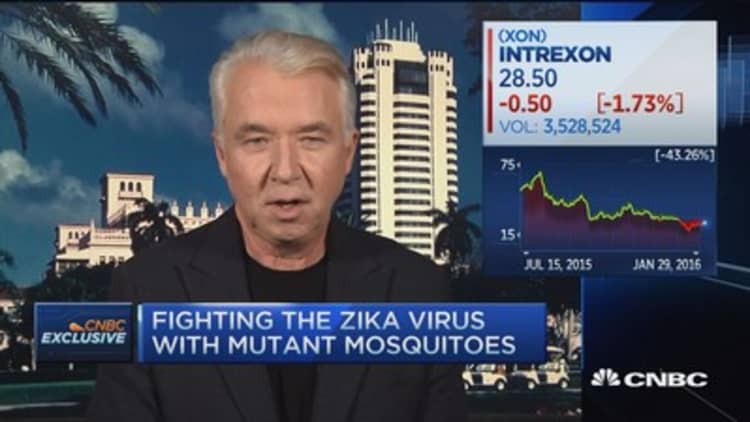With a 45 percent poverty rate and staggering debt of $70 billion, Puerto Rico was already in dire straits. Now add 19 confirmed cases of the mosquito-borne Zika virus.
The World Health Organization has described the virus, which is associated with severe birth defects in babies born to infected mothers, as "explosive." Given the ongoing transmission of Zika in Puerto Rico, the U.S. Centers for Disease Control and Prevention has issued a travel warning, recommending that pregnant women in any trimester postpone travel to the island and other locations experiencing outbreaks.
The CDC alert prompted airlines, including United Airlines, American Airlines and JetBlue, to issue refunds for tickets to Zika-affected areas.
Those airlines declined to comment on the exact number of people who canceled trips to Puerto Rico, but it's likely that many passengers took advantage of the opportunity to change their plans.
"The situation doesn't look good right now," said Justin Vélez-Hagan, founder and executive director of The National Puerto Rican Chamber of Commerce. "We already get calls from people asking if it is safe to travel to Puerto Rico, considering the economic conditions. If you combine this with the CDC's advice, it could certainly influence some people not to travel."
Up until a couple of weeks ago, the majority of Americans had not heard of Zika, which is why Vélez-Hagan did not have an exact estimate of how the virus has affected the local economy. He did note, however, that other mosquito-borne viruses, such as dengue fever and chikungunya, did not have a great impact on tourism, which accounts for about 10 percent of Puerto Rico's GDP.
"Since much of the data on tourism is not released until several months later, I have to base a lot of our estimations on past epidemics," Vélez-Hagan said.
The link to microcephaly is the big fear right now. The virus may not be as severe in terms of symptoms, but everyone is in extreme worry mode because it could potentially cause a very serious birth defect.Dr. Matthew Simsdirector of Infectious Disease Research, Beaumont Hospital
Past virus outbreaks haven't necessarily hurt Puerto Rican tourism. During outbreaks of the dengue virus that occurred in 2010, 2012 and 2015, the number of hotel registrants in Puerto Rico actually increased year over year. At the height of chikungunya in 2014 and early 2015, which affected more than 27,000 individuals, it was difficult to find any direct impact on tourism, noted Vélez-Hagan.
Even a relatively large drop in tourism may just be an additional hiccup in the scheme of Puerto Rico's economy, which many argue is the main problem, he added.
"Dengue fever and chikungunya are both much worse in terms of their symptoms," said Dr. Matthew Sims, director of infectious disease research at Beaumont Hospital in Royal Oak, Michigan. "The Zika virus is less severe in comparison."
Dengue fever and chikungunya have symptoms that are similar to those of Zika — fever, headache, joint pain and rash — and the former infections are actually more likely to result in symptoms than Zika is. But for many people, Zika holds more frightening potential than those viruses, because it has been linked to serious birth defects.
Eighty percent of Zika patients do not exhibit symptoms, leaving many women without a way to know about the development of their unborn children — which is the main concern when it comes to Zika.
The Zika outbreak has led to reports of increased numbers of women in Brazil giving birth to babies with microcephaly, a rare condition that causes the brain to develop abnormally in the womb and results in a very small head.

"The link to microcephaly is the big fear right now," said Sims. "The virus may not be as severe in terms of symptoms, but everyone is in extreme worry mode because it could potentially cause a very serious birth defect."
The connection of the virus to devastating syndromes associated with babies heightens fear among travelers, Sims said.
In addition, there are reports of adult Zika sufferers subsequently developing Guillain-Barre syndrome, another rare but serious nervous system disorder that can cause muscle weakness, poor coordination and paralysis.
No direct links between Zika and Guillain-Barre syndrome have been established. It's unclear whether the virus can be transmitted from mother to child during pregnancy or birth, although this can occur with both dengue and chikungunya.




